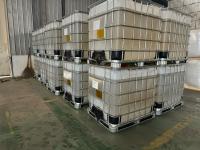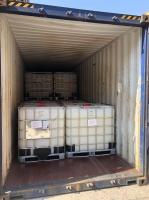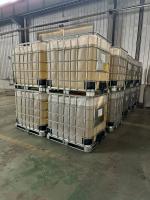Our Products
Product Center / polyamine of Floquat FL2350 can be repalced by Chinafloc--polyamine

Polyamine (Floquat FL2350) is a liquid cationic polymer used primarily in water and wastewater treatment processes, where it functions as a primary coagulant or coagulant aid. Manufactured by SNF, Floquat FL2350 belongs to a family of high-efficiency, water-soluble polyamines known for their strong positive charge, medium to high molecular weight, and effective performance across a wide pH range. The primary role of Floquat FL2350 is to neutralize negatively charged particles (such as colloids, organic matter, and suspended solids), promoting their aggregation into larger flocs for easy removal through sedimentation, flotation, or filtration.
The main application of polyamine Floquat FL2350 lies in the clarification and purification of water—whether from municipal, industrial, or natural sources. This comprehensive explanation explores how Floquat FL2350 is applied in various industries and processes, emphasizing its critical role in improving water quality, enhancing treatment efficiency, and reducing environmental impact.
1. Municipal Water and Wastewater Treatment
a. Raw Water Clarification
In municipal drinking water treatment plants, raw water from rivers, lakes, or reservoirs often contains turbidity, suspended solids, natural organic matter (NOM), and microorganisms. Floquat FL2350 is used as a primary coagulant to destabilize and agglomerate these fine particles.
Key Benefits:
-
Rapid destabilization of colloidal impurities
-
Formation of large, dense flocs
-
Improved sedimentation and filtration performance
-
Lower sludge production compared to traditional metal-based coagulants like alum or ferric chloride
Its effectiveness across a wide pH range makes it suitable for different water sources and treatment conditions.
b. Sewage and Sludge Treatment
Municipal wastewater, especially after biological treatment (secondary clarifiers), contains suspended solids, microbial biomass, and nutrients. Floquat FL2350 helps in:
-
Enhancing solid-liquid separation
-
Clarifying treated effluent
-
Reducing turbidity and residual BOD/COD
-
Improving sludge dewatering efficiency
By conditioning sludge before mechanical dewatering (e.g., belt press or centrifuge), it improves cake dryness and reduces sludge handling costs.
2. Industrial Wastewater Treatment
a. Textile and Dyeing Industry
One of the most common industrial applications of Floquat FL2350 is in treating wastewater from textile dyeing and printing operations. These effluents typically contain:
-
Reactive and acidic dyes
-
Starch and sizing agents
-
Surfactants and dispersants
-
High chemical oxygen demand (COD)
Floquat FL2350:
-
Coagulates dye molecules and suspended solids
-
Promotes formation of colored flocs for easy removal
-
Significantly reduces color, TSS (total suspended solids), and COD
When used in combination with anionic flocculants like polyacrylamide, it delivers a highly efficient two-stage treatment for textile wastewater.
b. Paper and Pulp Industry
In paper mills, Floquat FL2350 is applied for:
-
Fixation of anionic trash (negatively charged organic residues)
-
Improving retention of fillers and fibers on the paper machine
-
Enhancing the efficiency of white water recovery
-
Clarifying process and wastewater streams
It also helps manage pitch and resin problems by preventing agglomeration and deposition on equipment surfaces.
c. Chemical and Petrochemical Industries
Floquat FL2350 treats effluents from chemical manufacturing facilities that often contain emulsified oils, organic pollutants, and fine solids. Its cationic nature makes it ideal for:
-
Breaking oil-water emulsions
-
Coagulating chemical residues and surfactants
-
Improving dissolved air flotation (DAF) performance
It also assists in the clarification of process water used in reactors and heat exchangers.
3. Mining and Mineral Processing
In the mining industry, especially in ore beneficiation and tailings management, Floquat FL2350 is used for:
-
Clarifying water from flotation circuits
-
Thickening mineral tailings
-
Improving water recovery from slurry streams
For example, in coal washing or gold extraction, it helps separate ultra-fine particles from water, reducing tailings volume and enabling process water reuse.
4. Oil and Gas Industry
a. Produced Water Treatment
Produced water from oil and gas wells is typically contaminated with:
-
Residual oil droplets
-
Suspended solids
-
Scaling agents and chemicals
Floquat FL2350 is highly effective at:
-
Breaking oil-water emulsions
-
Promoting agglomeration of oil droplets
-
Improving gravity settling and flotation in treatment systems
b. Refinery Effluent Treatment
Refineries generate process wastewater containing hydrocarbons, heavy metals, and organics. Floquat FL2350 helps achieve effluent clarity and compliance with discharge regulations by enhancing coalescence and solid-liquid separation.
5. Food and Beverage Processing
Although not used directly in food production, Floquat FL2350 plays a key role in treating wastewater from food processing operations such as dairy, meat, poultry, and beverage manufacturing.
Its benefits include:
-
Coagulation of fats, oils, proteins, and suspended solids
-
Clarification of wastewater before biological treatment
-
Enhanced sludge dewatering after digestion or settling
The result is reduced organic load, improved effluent quality, and efficient water recycling within the plant.
6. Sludge Conditioning and Dewatering
Sludge from biological treatment processes is typically thickened and dewatered before disposal. Floquat FL2350 improves:
-
Filter press and centrifuge efficiency
-
Sludge cake solids concentration
-
Reduction in polymer usage when combined with flocculants
It contributes to lower transport and landfill costs while enhancing the overall sustainability of treatment operations.
7. Tannin, Heavy Metals, and Color Removal
Certain industrial effluents, such as those from leather tanning or wood processing, contain tannins and heavy metals. Floquat FL2350 can be used to:
-
Precipitate tannins and complex organic matter
-
Assist in the coagulation of metal hydroxides
-
Improve the removal of color-causing compounds
This helps meet stringent discharge standards and protects downstream ecosystems.
Conclusion
The main application of polyamine Floquat FL2350 is in water and wastewater treatment, where it acts as a powerful cationic coagulant. Its primary role is to neutralize negative charges on particles, allowing for the effective aggregation and removal of impurities. From municipal water plants to textile factories, oilfields, food processors, and mining operations, Floquat FL2350 improves treatment efficiency, reduces sludge generation, and enhances water clarity.
Its key advantages include:
-
Broad applicability across industries
-
Fast and efficient coagulation performance
-
Lower sludge production than inorganic coagulants
-
Compatibility with a wide range of water qualities and treatment systems
In summary, Floquat FL2350 is a versatile and high-performance solution for modern water treatment challenges, enabling safer water reuse, regulatory compliance, and more sustainable operations across diverse industrial sectors.




728_small.jpg)
